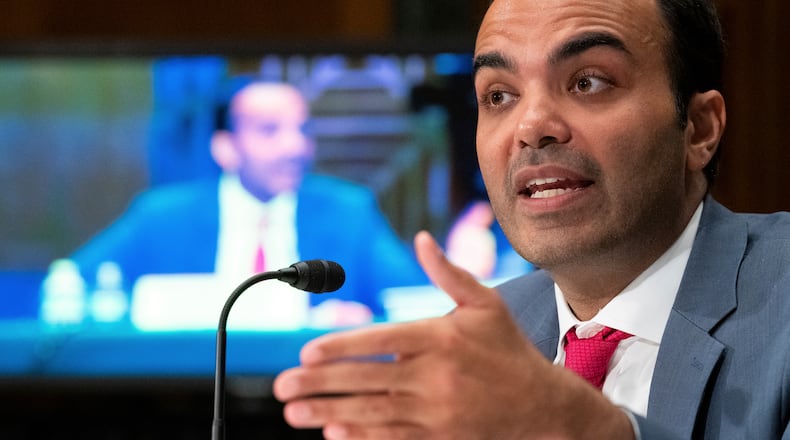The U.S. Consumer Financial Protection Bureau will start sending refund checks to more than 240,000 Georgians who were charged illegal junk fees by a group of credit repair companies, the bureau announced Thursday.
In all, more than $103.5 million will be disbursed to people in the state from the CFPB’s victims relief fund, one of the top payouts across the country.
About 4.3 million people nationwide will receive nearly $2 billion in checks from the agency’s victims relief fund, officials said.
“This historic distribution of $1.8 billion demonstrates the CFPB’s commitment to making consumers whole, even when the companies that harm them shut down or declare bankruptcy,” Rohit Chopra, the agency’s director, said in a statement.
The CFPB’s victims relief fund is funded by civil penalties paid by companies that violate consumer protection laws. No taxpayer funds will be used to repay consumers, CFPB officials said.
The bureau last year settled its lawsuit against two of the biggest credit repair companies in the country — Lexington Law and CreditRepair.com — and a handful of other companies for illegally collecting upfront fees for services they had telemarketed to consumers. They were ordered to pay massive fines and barred from telemarketing credit repair services for a decade.
“The CFPB provides the largest redress in history, over a billing technicality — not a question over whether consumers received the agreed upon credit repair services or the efficacy of those services,” Eric Kamerath, an attorney representing Lexington Law Firm and CreditRepair.com, said in an email. Kamerath has represented the companies for more than 10 years.
“There was never any question about whether consumers received the services as advertised. The issue was when it was appropriate to bill for those services,” he said.
The court ruled that the companies charged illegal advance fees or used deceptive “bait-and-switch” advertising, the agency said Thursday.
“Lexington Law and CreditRepair.com exploited vulnerable consumers who were trying to rebuild their credit, charging them illegal junk fees for results they hadn’t delivered,” Chopra said.
Not long after the district court’s ruling, the companies filed for Chapter 11 bankruptcy protection, closing about 80% of their business operations, including their telemarketing call centers, he said.
The checks will be sent between Dec. 5 and Jan. 6, 2025. The payments are calculated as a share of fees paid by consumers, but may not cover the entire amount, according to the CFPB.
Those affected don’t have to do anything — the CFPB has identified the customers charged the illegal fees and will send them a letter and payment.
Liz Coyle, executive director of the nonprofit consumer advocacy organization Georgia Watch, told The Atlanta Journal-Constitution this was “tremendous news.”
These companies were “literally profiting by promising to help people improve their credit scores, and instead charging them outrageous fees and interest rates,” Coyle said, “often not having any effect on actually reducing the debt burden on Georgians.”
Kamerath said the fees charged by Lexington Law and CreditRepair.com are on the order of $100 per month and that there was no applicable interest rate.
“The services are related to addressing the propriety of information appearing on a consumer’s credit report,” he said.
Coyle noted there are nonprofits in the state that can help people repair their credit scores and that Georgians should be aware of predatory practices.
“If someone is offering something that sounds too good to be true, take a look at how they’re standing to profit from it,” she said.
The CFPB refund is the largest payment yet made by the 13-year-old agency, but it comes as the future of the CFPB is uncertain. Elon Musk, who has been tapped by President-elect Donald Trump to spearhead government cost-cutting proposals, said last week he wants to “delete” the bureau.
But Coyle is not concerned about the bureau’s fate.
She was on the CFPB’s consumer advisory board during the first Trump administration and saw that the work of the bureau continued, pointing to the fact the lawsuit that led to these refund payments was filed in 2019 during Trump’s first term. She said the law that created the bureau, the Dodd-Frank Act, would have to be overturned to eliminate the CFPB.
“While there will be a change at the helm, I’m confident that the law is on the side of the CFPB continuing to do the critical work that they’ve done,” she said.
Details about the distribution are available at cfpb.gov/payments/lexlaw.
This story has been updated to add comments from an attorney representing Lexington Law Firm and CreditRepair.com.
The Atlanta Journal-Constitution and Report for America are partnering to add more journalists to cover topics important to our community. Please help us fund this important work here.
Keep Reading
The Latest
Featured



